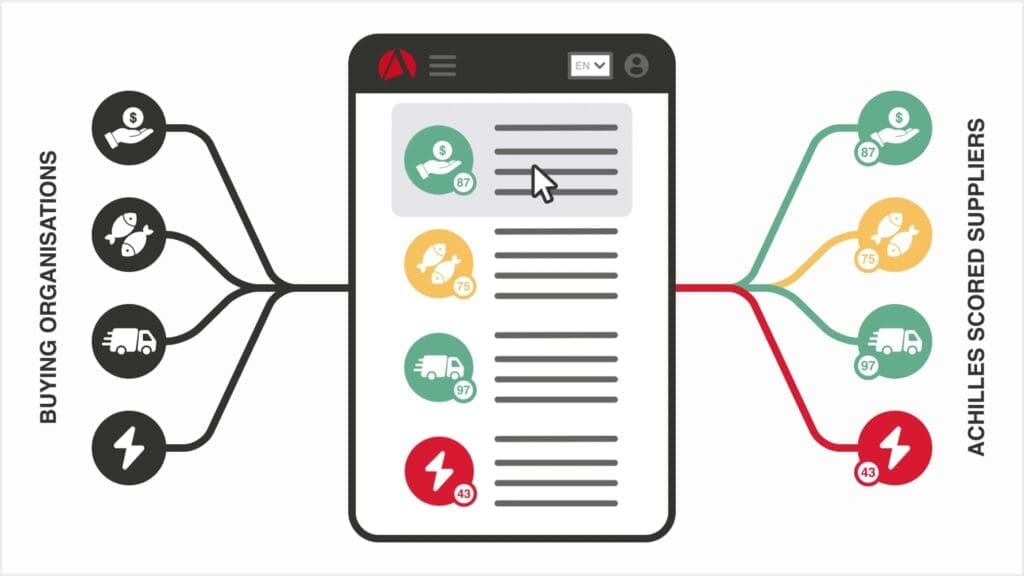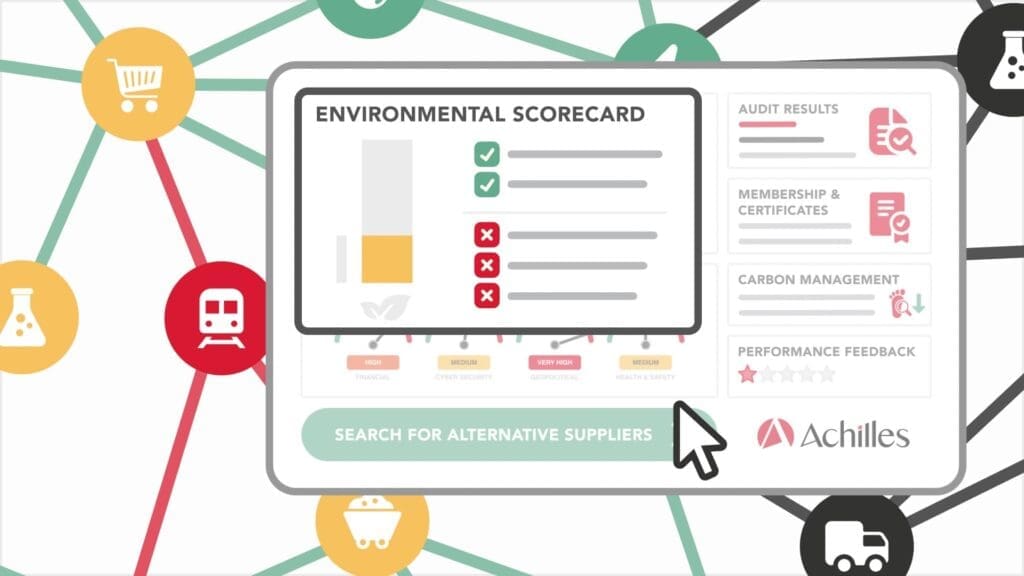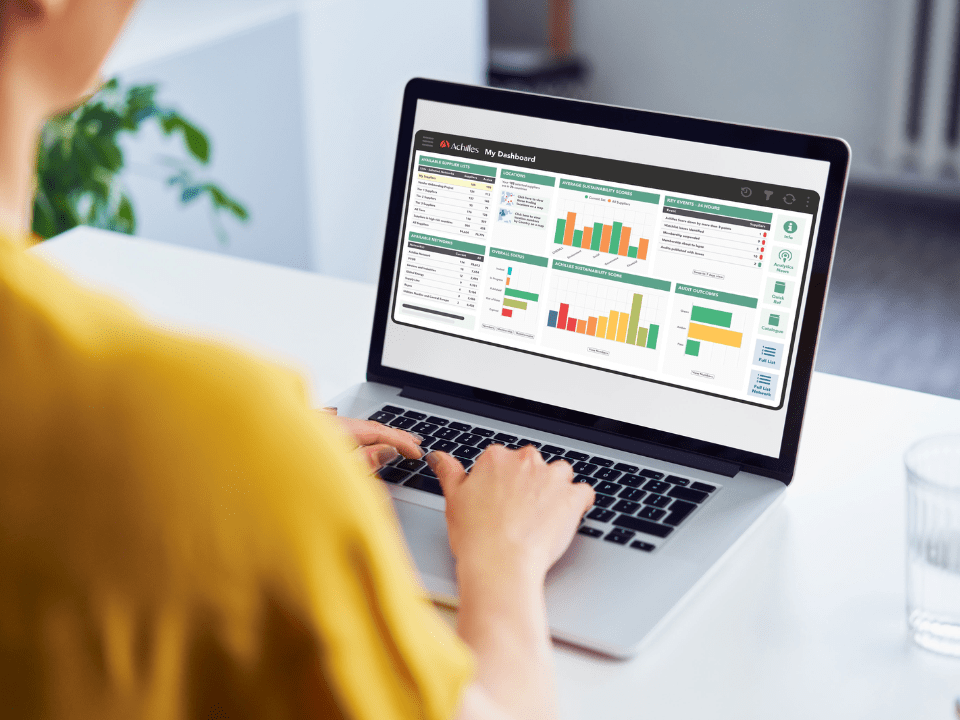The Achilles Sustainability Score is a summary of an organisation’s supply chain risk performance. It enables organisations to measure their ESG supplier performance and drive improvement. It also enables organisational buyers to assess the credentials of potential suppliers and make more sustainable and lower risk procurement decisions.
The score has been developed over many years by Achilles’ ESG data scientists. The algorithms that underpin the score are regularly reviewed to ensure they align to internationally recognised standards. It covers a wide range of factors across 4 key focus areas; environment, social, governance and financial. The score sits alongside, the Achilles health and safety, cyber risk and watchlist analysis to provide a comprehensive review of supply chain risk.
Understanding the Achilles Sustainability Score
The Achilles Sustainability Score measures a company’s supplier credentials using a numeric system between 1 and 100 as follows:
- Excellent: 81+
- Good: 61 – 80
- Satisfactory: 46 – 60
- Below Average: 21 – 45
- Requires improvement: <45
Companies with excellent scores of 81+ are in the top 15% of all suppliers in Achilles’ networks, while scores of 61-80 are considered good and above average. A score of 45 or below suggests that buyers should investigate further, as these suppliers may require improvement and active engagement.

How the Achilles Sustainability Score is calculated
The Achilles Sustainability Score is calculated based on data points from the online Achilles questionnaire as well as credit scores from third parties.

Specific rules determine how each questionnaire response contributes to the score. Compliance evidence, such as certified management systems or valid insurance policies, can boost your score, while expired or missing data can result in deductions.
You can read more about the Achilles Sustainability Score methodology here.
Improving your Achilles Sustainability Score
The Achilles Sustainability Score is a powerful tool for continuous improvement. It helps identify your strengths and weaknesses, enabling you to understand where to focus your improvement activity.
Improving your Achilles Sustainability Score increases the attractiveness of your business to buyers using the MyAchilles platform.
Here are some top tips to help optimise your score:
1. Review your strengths and weaknesses scorecard
Start by clicking on each score pillar in your Achilles profile and thoroughly reviewing the strengths and weaknesses listed. You will see that these correspond closely to questions you answered in the questionnaire.
- Identify key risk areas: Focus on the score pillars where your score is weaker. You may see that the score for Environmental is lower than that for Social.
- Update questionnaire responses and documents: If certain areas are flagged in the scorecards with amber or red circles, make it a priority to update the corresponding questionnaire responses and documents. Ensure all answers are current and accurately reflect your company’s capabilities and practices.
2. Keep your questionnaire up to date
One of the most common reasons for a lower Achilles Sustainability Score is an outdated questionnaire (more than 12 months since last update).
- Routine checks: Set a schedule to review and submit your questionnaire responses, leaving sufficient time for Achilles to review and publish the updates before 12 months elapse. You will receive email reminders if you are set up as one of the key contacts.
- Reflect changes in your business: Make sure any significant changes in your business structure, policies, or performance are reflected in the questionnaire.
3. Monitor your third-party credit scores
Your Achilles Sustainability Score can be negatively impacted if your third-party credit scores deteriorate. To prevent this:
- Regular monitoring: Keep a close eye on your credit scores from third-party providers to ensure they have the correct financial data from your company. Our providers – Creditsafe, Informa, Equifax and Experian – vary by country. Please contact Achilles if you require more detail.
- Address issues promptly: If there are any issues or discrepancies, contact the credit rating agency directly to seek a correction. Achilles data is refreshed from the agencies periodically.
4. Upgrade your subscription
Upgrading your Achilles subscription can provide additional opportunities to provide more in-depth assessment through scores. Consider the following:
- Advanced module: Where available, modules like Transparency & Due Diligence and Carbon allow you to provide more comprehensive information and get a more complete evaluation.
- Network upgrades: Joining additional networks and upgrading to higher level packages (e.g. upgrading from Silver to Silver+) also improves the depth of data available to support your score.
- In-person audits: Audits provide the opportunity to engage directly with an Achilles auditor to understand more about how to improve performance and boost your score.
5. Focus on continuous improvement
Improving your Achilles Sustainability Score is not a one-time effort but an ongoing process. Adopt a mindset of continuous improvement by:
- Regular reviews: Continually review and refine your responses and business practices.
- Employee training: Ensure your team is aware of the importance of maintaining high standards and is trained to provide accurate information via the MyAchilles platform.
- Feedback loop: Use the feedback from your scorecard and audits to make tangible improvements in your operations and practices.
6. Speak to an Achilles expert
If you are unsure about how to address specific weaknesses or need guidance on improving your score, don’t hesitate to contact us. The Achilles team is here to help on how to improve your responses and overall score.



